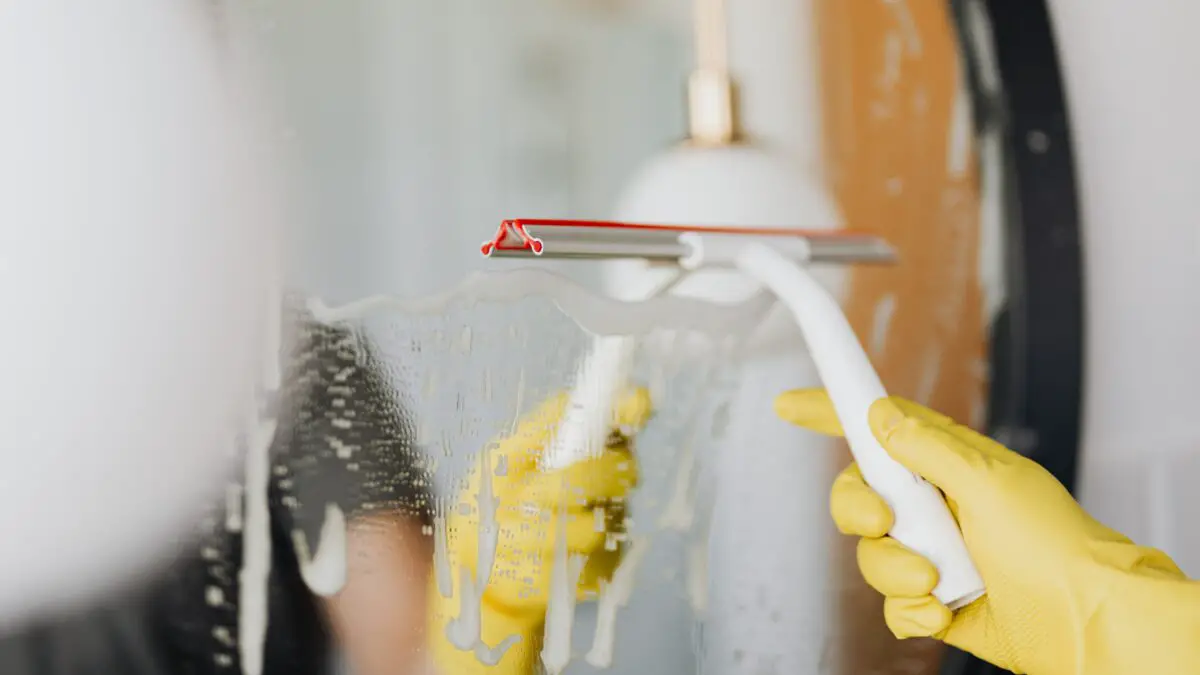Whether you’re in the mood for spring cleaning or you want some other clean idioms, the English language has a wide range of expressions in this category.
Interestingly, not all of the phrases you’re about to see are idioms about cleaning specifically. The word ‘clean’ can be used to talk about tidying up, telling the truth, finances, fresh starts, and much more.
So, let’s get stuck in with our list of cleaning idioms, all accompanied by definitions and example sentences.

Clean idioms
As clean as a whistle
We’ll start with an idiom that is actually about cleaning! If something is as clean as a whistle, it is completely clean and spotless.
“It’s so satisfying to see my house as clean as a whistle, even if it takes me all day.”
However, it can be used in another sense to describe a person who has a good moral character and behaves well.
“You can trust Mika on this job. I’ve known him for years and he’s clean as a whistle.”
You’ll see from the example above that it’s ok to drop the initial ‘as’ from this simile.
A clean break
The word ‘clean’ in these clean idioms takes on many different meanings. In this phrase, it is used to mean ‘new’ or ‘fresh’. So a clean break is a complete and final separation from something and a transition to something new.
“I’ve been working in this job for 12 years and I’m ready for a clean break.”
A clean bill of health
Here’s a nice health idiom that everybody wants to hear. A clean bill of health is a positive report about your well-being or condition. It means that there is nothing of concern in your medical report, or that you have fully recovered after an illness or injury.
“Thankfully, Steve has received a clean bill of health and can return to playing next week.”
Spring clean
Spring is the season of new life and a fresh start. It’s a time when many people decide to thoroughly clean and tidy their homes, a process known as spring cleaning.
This could also include sorting out items, removing things you no longer use, and changing the clothes in your wardrobe.
“Every year I love to have a good spring clean to freshen up the house.”
There are plenty of other spring idioms that are not just related to the season.
A clean conscience
Someone with a clean conscience has no feelings of guilt or remorse. Their state of mind is free from the sense of any wrongdoing.
“I handed the wallet I found to a police officer so that I could have a clean conscience.”
This is one of the clean idioms where you may hear the word ‘clear’ used instead, as in a clear conscience.
A clean conscience makes a soft pillow
Expanding on the clean idiom above, a clean conscience makes a soft pillow suggests that living guilt-free will lead to a peaceful and restful sleep. If you feel good about your actions, you will avoid the stress and anxiety that comes with feeling guilty.
“I’m glad that you told the truth; a clean conscience makes a soft pillow.”
This also features on our list of sleeping idioms.
Keep your nose clean
This rather unusual saying, keep your nose clean, is telling you to stay out of trouble and avoid doing anything that might cause problems.
“My son has just come out of prison so he really needs to keep his nose clean.”
Wipe the slate clean
Some of these expressions are great to use after an argument or when something bad has happened.
To wipe the slate clean means to start afresh and forget about the past.
“I think it’s time we wipe the slate clean and move on with our lives.”
After doing this, you might refer to having a clean slate – an opportunity to move on from past problems with a fresh start.
“I know we have a rocky past with this company, but let’s go into the meeting with a clean slate and see what they are proposing.”
A clean sheet
A clean sheet is similar in meaning to ‘a clean slate’, although this phrase has a broader application.
A person who has a clean sheet has no record of wrongdoing, whether because they have always behaved well or because a past misdemeanor was forgotten or erased from their record (particularly a criminal record).
“We’re moving to a new city next month, so Sonny can start in a new school with a clean sheet.”
This saying can also refer to a situation where there are no restraints and a person is free to do as they please.
Finally, in a sporting sense (especially in British football), a team with a clean sheet has won all their matches without having any goals scored against them.
“It’s quite impressive to get through the whole season with a clean sheet.”
A clean sweep
Here we have another similar-sounding cleaning idiom. This one, however, refers to a broad movement that affects everyone or everything involved. It’s often used in companies to describe large-scale changes in management or staffing.
“The company made a clean sweep of the old management team and brought in new leadership.”
A clean sweep can also mean a convincing victory in which one team or party takes all or most of the votes or points required to win.
A new broom/brush sweeps clean
This is an older saying that may well be the origin of the idiom ‘clean sweep’. A new brush sweeps clean refers to the fact that when a new manager or leader takes charge, they often make significant changes and improvements.
It could be restructuring the team, improving ways of working, or getting rid of unprofitable parts of the business.
“I think the new CEO is doing well. I mean, a new brush sweeps clean, right?”
Check out some other interesting change idioms that relate to situations like this.
Clean getaway
When someone successfully and swiftly escapes a dangerous or difficult situation they have a clean getaway. This idiom is often used to describe perpetrators escaping the scene of their crime.
“Sadly, the team of robbers managed a clean geaway and the police are still searching for them.”
Clean up your act
Here’s another of the many clean idioms that doesn’t refer to physically cleaning something. When you are told to clean up your act or clean your act up, you need to make positive improvements in your behavior, habits, or attitude.
“I’ve been grounded for the third time this month. I really need to clean my act up.”
My hands are clean
You might say my hands are clean to claim innocence in the face of accusations or suspicion. This clean idiom is often accompanied by the action of holding your hands up.
“I had nothing to do with the missing money – my hands are clean.”
Although the origin of this saying dates back to ancient times when people believed that guilt could be seen on someone’s hands, it also has close links to the play Macbeth, where Lady Macbeth tries to wash imagined bloodstains from her hands. In fact, there are many Shakespeare-inspired idioms still used in modern English.

Idioms about cleaning
Clean out
There are several definitions of the phrasal verb clean out, but it generally means to remove or clear something from a space or area, usually by cleaning or tidying.
“I need to clean out my car before I pick my grandfather up from the station.”
“Suzie, I want you to clean out your hamster’s cage this afternoon.”
It can also be used as a money idiom, relating to a situation where your finances have been significantly depleted.
“The con-man cleaned me out of my life savings.”
“Paying for my daughter’s university has cleaned me out.”
Take to the cleaners
Here’s another cleaning idiom that relates to finances. To be taken to the cleaners is to be cheated, swindled, ripped off, or financially exploited by another person, usually for a significant amount of money.
“The used car salesman took me to the cleaners by selling me a faulty car for twice its worth.”
“Are you trying to take me to the cleaners with that offer?”
Elbow grease
If you’re giving something a good clean, you may need to use some elbow grease. This is not a special cleaning product, but just the act of scrubbing something vigorously.
“You’ll need to use a bit of elbow grease if you want to get that oven clean again.”
This idiom can also be used in a broader sense to refer to any kind of strenuous, physical effort needed to achieve a result.
Clean up
Here’s another cleaning idiom with many possible meanings. To clean up can simply be to clean and tidy a space by removing clutter, dirt, or mess.
“Chris, I hope you’re going to clean up that mess when you’ve finished repairing your bike.”
“Kids, that’s enough craft time. Let’s clean up before dinner.”
It can also refer to improving or refining something, such as a process, system, or product. Or it could mean that you won a lot of money, normally when gambling.
“I’m going to focus on cleaning up our SOPs this week.”
“I cleaned up at the race track today.”
Clear the air
Clear the air is an important idiom about talking and communicating. After a disagreement, misunderstanding, or conflict, you do this to alleviate tension and hopefully resolve the issue between the people involved.
“We needed to clear the air before we could move forward with the project.”
Squeaky clean
You can describe a person as squeaky clean if they are completely innocent, pure, and free of flaws.
“I don’t believe that she really is as squeaky clean as she is pretending to be.”
It can also be used in a more literal sense to describe an object that is perfectly clean.
Come clean
There are plenty of clean idioms about being guilt-free, and here is another one. To come clean is to confess to something or to be honest or transparent about your actions and intentions, especially after initially trying to conceal the truth.
“I think it’s about time I come clean and admit it was me that ate the last slice of cake.”
“I think you should come clean about why you are really here.”
You can find some more truth and lie idioms here.
Get your clock cleaned
Although a popular saying in the world of boxing and MMA, this can be used any time someone is hit, defeated, or badly injured.
The ‘clock’ in the saying get your clock cleaned refers to your head, face, or body. And the ‘cleaned’ part of the expression refers to being badly hurt during some form of altercation or fight.
“The champ really got his clock cleaned tonight by the new challenger.”
It’s surprising how many sports-inspired idioms we use in English.
Wipe the floor (up)
Here’s another cleaning idiom that relates to defeat, although not necessarily in a physical fight. If you wipe the floor (up) with someone, you easily and thoroughly defeat them in a competition.
“Wow, you absolutely wiped the floor up with that guy!”
You’re likely to hear ‘up’ in the American English expression, whereas British English omits it.
Neat as a pin
If something is as neat as a pin it is extremely tidy, with everything in the correct place.
“The hotel room was as neat as a pin when they checked in.”
Pick something clean
Feel free to use this saying when talking about food and eating. This is because someone who picks something clean consumes every last bit of food, leaving nothing behind.
“The guests picked the buffet table clean. I couldn’t believe it!”
This expression can also be used for more general situations when everything was taken and nothing was left behind. An example of this would be bargain hunters buying all the reduced items in a store and leaving nothing good for everyone else.
Sweep it under the rug/carpet
Sweep something under the rug is not a cleaning idiom about cutting corners when you clean your house! It actually refers to trying to hide or ignore a problem with the hope that it will disappear or you won’t have to deal with it.
“The boss is trying to sweep the scandal under the rug, but eventually it will become public knowledge.”
Clean house
Again, this clean idiom doesn’t relate to cleaning your home, even though it sounds like it should. Clean house is actually a term mostly used in business to refer to ridding the organization of anything undesirable – whether people, practices, or processes.
“The first thing the new management team did was to clean house and bring all their own people in.”
Many house idioms in English refer to the places where we live, but many others refer to something completely different – like this one!
Clean/scrub up well
If somebody usually dresses quite casually or in scruffy clothes, you might be surprised how different they look when they make an effort to get dressed up.
Whether it’s a smart suit or a fancy gown with beautiful hair and makeup, you could comment that they scrub or clean up well.
“Well look at you with your new hairstyle. You clean up well.”
There are many more clothes idioms you can use to comment on someone’s sense of style and fashion.
Dirt cheap
This expression may sound like the opposite of clean, but it’s a popular saying worth knowing! If something is dirt cheap, it is very inexpensive.
“My first car was dirt cheap.”
Let the dust settle
After a period of chaos, excitement, or conflict, you may wish to let things calm down, become clearer, or return to normal before taking any further action. This is referred to as letting the dust settle.
“We had a big argument last night so I think I’ll just let the dust settle before I mention it again.”
Dust yourself off
If you have experienced a setback or difficulty but you decide to put it behind you and try again, you dust yourself off.
“After I lost all my money I dusted myself off and started another business.”
You can also use this cleaning idiom in a more literal sense; when you dust off an item you simply remove dust or dirt from it by wiping or patting it.
Clean idioms are a fun and creative way to add color and depth to our everyday conversations. Whether you’re tidying up your home, making changes at work, starting fresh, or dealing with the aftermath of a messy situation, we hope these expressions and examples will help make your language more interesting!



